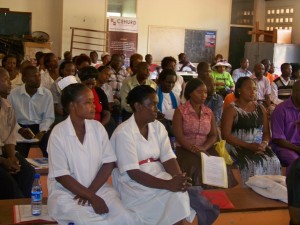By Henry Zakumumpa
More than half of all pregnancies in Uganda are unintended and nearly a third of them end in abortion, according to survey results unveiled by Dr Charles Kiggundu, a consultant gynaecologist at Mulago hospital.
“Probably half of all of you seated in front of me today were not intended by your parents,’’ Dr Kiggundu told a fully- packed Palm conference room at Kabira Country Club in the outskirts of Kampala.
The study results released by the US-based, Guttmacher Institute and the Centre of Health, Human Rights and Development, also reveal that Ugandan women on average wished they had at least two children less, a phenomenon also called excess fertility.
On average, each woman in Uganda gives birth to 6.7 children which is high even by Sub-Saharan African standards. The study results are based on analysis of Uganda’s 2011 Demographic and Health Survey.
At the centre of the millions of unintended pregnancies in Uganda, is non-use of contraception.
Only an estimated 25 per cent of women in Uganda have access to modern contraception methods pointing to a staggering lack of access to modern and safe contraception.
One in three married women in Uganda had an unmet need for contraception according to the survey results.
“It is also a question of having less options of contraception,’’ added Dr Frederick Mugisha, a health economist, who maintained that Ugandan women do not have many choices when it comes to contraception.
Clearly, investments targeted at increasing access to family planning and contraception for women of reproductive age in Uganda would save the country phenomenal sums of monies spent on treating post abortion complications and having fewer mouths to feed, educate and would be kinder to the environment. If all Ugandan women had met their wish of having two children less than they currently have, the population of Uganda would have been undoubtedly impacted by gains in per capita income and a better quality of life achieved for millions of Ugandans.
It emerged at the meeting that myths and misconceptions about modern contraception methods causing cancer and fibroids is widespread and is a barrier to contraception utilisation by Ugandan women.
The traditional medicinemen have hijacked contraception education. There are several programmes on local radio and television stations that are misinforming many women on safe contraception in preference for crude and riskier methods.
Dr Zainab Akol of the Ministry of Health regretted that the medical profession in Uganda has ceded the ground for offering scientific and evidence-based contraception information to misinformed “medicine men” on whose inaccurate advice many rural and uneducated women depend for decisions on birth control and family planning.
Unsafe abortion and contraception is a human rights, public health, legal and moral issue in Uganda that must be addressed,’’ emphasised Moses Mulumba, head of the Centre for Health, Human Rights and Development, who revealed that 26 per cent of all maternal deaths are attributed to unsafe abortion.
Prof Ben Twinomugisha, dean of the School of Law at Makerere University, emphasised that human beings have a right to enjoy sex and then when debating issues surrounding abortion, “the woman should be at the centre” of the debate.
Studies done by the Guttmacher institute show that there is a co-relation between restrictive laws on birth control and increased abortion. Countries, especially in Europe, which have a liberal stance on birth control have fewer deaths from unsafe abortions and spend less on post abortion complications.
Source: http://www.monitor.co.ug/artsculture/Reviews/Contraceptives-can-reduce-the-number-of-unsafe-abortions/-/691232/1712464/-/13kqg7lz/-/index.html

